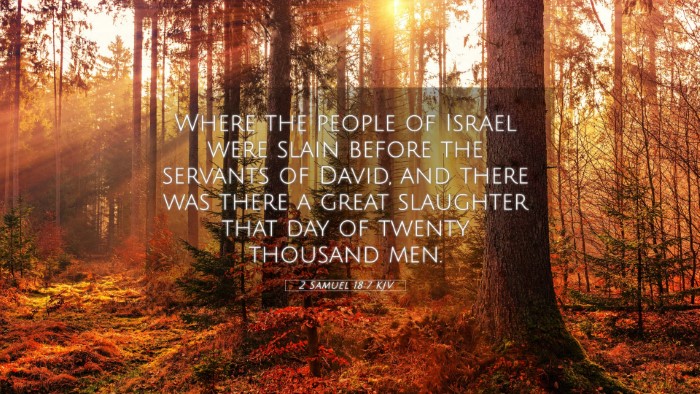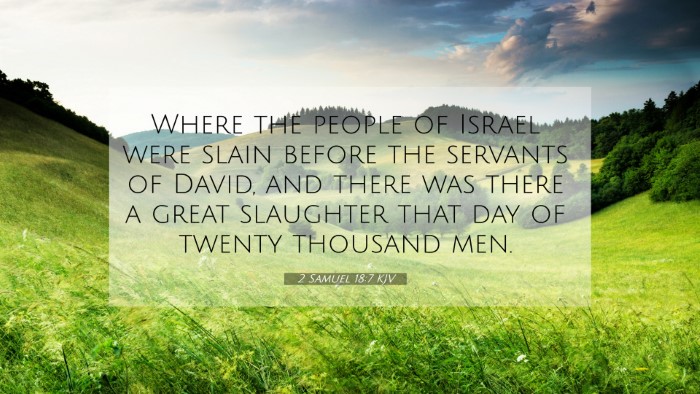Understanding 2 Samuel 18:7
In 2 Samuel 18:7, the verse recounts a pivotal moment during the conflict between King David and his son Absalom, during which the forces of David engaged in battle against Absalom's supporters. The verse states, "And the men of Israel were slain before the servants of David, and there was a great slaughter that day of twenty thousand men."
This verse carries significant weight in the narrative of the struggle for the throne and highlights themes of rebellion, leadership, and the tragic consequences of familial conflict.
Commentary Insights
According to Matthew Henry, this verse underscores the severity of the conflict, emphasizing that the battle was not merely a struggle for power but resulted in significant loss of life. Henry notes that the high number of casualties signifies the gravity of civil war, prompting reflection on the destructive nature of internal strife.
Albert Barnes interprets this event as a narrative confirmation of the prophetic warning David received regarding the turmoil within his own house, as outlined in earlier chapters. He points to the divine justice that manifests in these events, highlighting that Absalom’s rebellion ultimately leads to devastation not only for his supporters but also for the nation as a whole.
Adam Clarke provides further depth by illustrating the tragic irony in Absalom's downfall. He remarks on the futility of Absalom's ambition and the devastation it brought upon both himself and the people. Clarke emphasizes that the catastrophic outcome was not just a military defeat but a poignant reminder of the consequences of disobedience and rivalry against divine authority.
Thematic Connections
The themes presented in 2 Samuel 18:7 can be explored through various connections to other scripture. Here are some notable references that relate to this verse:
- 2 Samuel 15:12 - This verse denotes Absalom’s growing rebellion and the initial steps he took against his father, linking to the ultimate battle.
- 2 Samuel 18:14 - Joab's actions during this battle are further elaborated in the ensuing verses, making clear the complexities of the conflict.
- Galatians 6:7-8 - This New Testament passage reiterates the principle of reaping what one sows, linking to Absalom's fate.
- Psalm 3:1-2 - David's lamentation over Absalom in this psalm reflects the anguish and turmoil of familial betrayal.
- Proverbs 16:18 - This verse warns about pride leading to destruction, applicable to Absalom’s prideful ambitions against his father.
- 1 Chronicles 20:1 - Provides further context on the military endeavors of David and the conflicts he faced during his reign.
- Matthew 26:31 - Echoes themes of betrayal and the sorrow of lost loyalty, drawing parallels to David and Absalom.
Applications and Lessons
Psalm 18:7 serves as a stark reminder of the devastating effects of division and conflict, which are prevalent not just in this historical narrative but in contemporary contexts as well.
From a practical perspective, readers can apply the insights derived from this scripture and its connections:
- Reflect on Leadership: Understanding the weighty responsibilities of leadership and the need for humility.
- Cultivate Family Relations: Encouraging reconciliation and love within families to prevent schisms that lead to strife.
- Consider the Seeds We Sow: Acknowledging the impact of one's actions, whether in personal ambition or in relationships, and the inevitable repercussions.
- Seek Wisdom in Conflict: Emphasizing the importance of sound judgment and guidance through prayer and scripture when facing disputes.
Cross-referencing Biblical Texts
For those engaging in cross-referencing biblical texts, this verse provides a foundational understanding of the narrative arcs present in both the Old and New Testaments. Resources like a bible concordance or a bible cross-reference guide can enhance the study by providing insight into how these themes are reiterated and developed across scripture.
The lessons of 2 Samuel 18:7 can be further unpacked using a cross-reference Bible study approach that draws connections to other significant passages. Seeking to understand the connections between Bible verses not only aids in personal interpretation but also enriches knowledge of Scriptural continuity and thematic resonance.
Conclusion
Ultimately, 2 Samuel 18:7 offers crucial insights into the nature of conflict and its far-reaching consequences, with ample room for thematic exploration through scriptural cross-referencing. The essential takeaways from this examination invite readers to ponder the intricate dynamics of leadership, familial ties, and the weight of individual decisions within the context of God’s overarching narrative.











